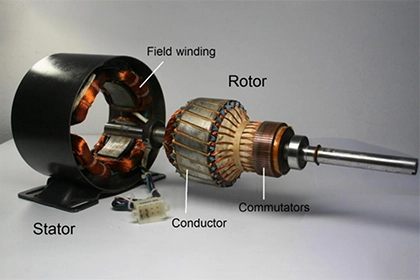
Can ac servo motor driver work without hall sensors?
AC servo motors are used in various industrial industries. Do you know if AC servo motors can operate without the use of Hall sensors? This article discusses this issue.
The use of AC servo motors in various industrial applications has become increasingly prevalent due to their precise control and high-performance capabilities. One common question that arises is whether an AC servo motor driver can operate effectively without the use of Hall sensors. This essay aims to provide a detailed analysis of the feasibility of running an AC servo motor driver without Hall sensors. By understanding the role of Hall sensors and exploring alternative methods, professionals can make informed decisions regarding their motor control systems.
I. Understanding Hall Sensors in AC Servo Motors
- Role of Hall Sensors
Hall sensors are commonly used in AC servo motors to provide feedback on rotor position. They detect the magnetic field changes caused by the permanent magnets on the rotor, enabling precise control of motor speed, torque, and position.
- Significance of Hall Sensor Feedback
Hall sensor feedback is crucial for accurate motor control. It allows the servo motor driver to determine the rotor's position relative to the stator, enabling precise commutation and synchronization of the motor's phases.
II. Alternative Methods for Rotor Position Detection
- Encoder Feedback
Encoders are widely used as an alternative to Hall sensors for rotor position detection in AC servo motors. Optical or magnetic encoders provide high-resolution feedback, allowing for precise control and position accuracy.
- Resolver Feedback
Resolvers are another alternative to Hall sensors, providing position feedback based on the rotor's angular displacement. They are robust, reliable, and suitable for harsh environments, making them a viable option for certain applications.
- Sensorless Control Techniques
Sensorless control techniques utilize advanced algorithms and mathematical models to estimate the rotor position without relying on external sensors. These techniques often employ current and voltage measurements to infer the rotor position, offering cost-effective solutions with simplified control systems.
III. Benefits and Limitations of Hall Sensor-Free Operation
- Benefits of Sensorless Operation
Operating an AC servo motor driver without Hall sensors offers several advantages. It eliminates the need for additional hardware, reducing costs and simplifying the motor control system. Sensorless control techniques also enhance system reliability by eliminating potential failure points associated with external sensors.
- Limitations and Considerations
While sensorless control techniques have made significant advancements, there are limitations to consider. Sensorless systems may have reduced accuracy and performance in certain operating conditions, such as low speeds or high loads. The motor's characteristics, such as inductance and resistance, can also impact the effectiveness of sensorless control methods.
IV. Application Considerations and Trade-offs
- Application-Specific Requirements
Consider the specific requirements of the application when deciding whether to operate an ac servo motor driver without Hall sensors. Applications that demand high precision, such as robotics or CNC machines, may benefit from the accuracy provided by Hall sensors or alternative position feedback devices.
- Cost and Complexity Trade-offs
Evaluate the cost and complexity trade-offs associated with using Hall sensors or alternative position detection methods. While sensorless control techniques offer cost savings, they require sophisticated control algorithms and may have limitations in certain operating conditions.
Conclusion
The feasibility of operating an AC servo motor driver without Hall sensors depends on the specific application requirements, cost considerations, and the availability of alternative position detection methods. While sensorless control techniques have made significant advancements, they may not be suitable for all applications, particularly those that demand high precision or operate in challenging conditions. Professionals must carefully evaluate the benefits and limitations of sensorless operation and consider trade-offs in cost, complexity, and performance to make informed decisions regarding their motor control systems.



Leave a Comment